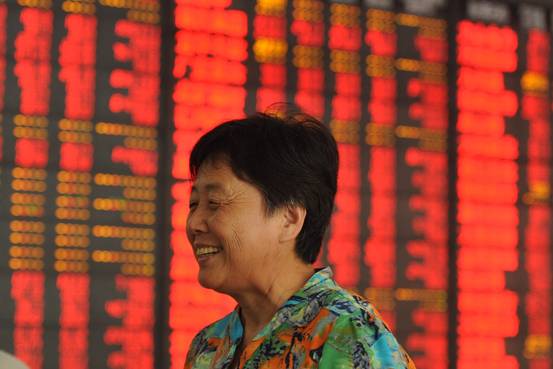
Memo to China: Your Market Moves Are Doomed to Fail

ChinaFotoPress/Getty Images
In your heart, you probably hope the Chinese government will succeed in its stunning interventions this past week to stay the panic on China’s stock exchanges.
In your head, you should suspect it will fail.
There’s something poignantly human about every attempt to make markets behave as we all wish they would: always rising and making us richer, never falling and inflicting pain upon us.
Governments have been trying—and failing—to control markets for centuries. If the Chinese government succeeds, it will be the exception to that rule. If it fails, the results could be dire.
The Chinese authorities made a rising stock market such a priority that they encouraged local investors to buy stocks on margin, or with borrowed money, until total margin loans exceeded $320 billion. That was nearly 9% of the total value of Chinese stocks—and 10% greater than the gross domestic product of Hong Kong.
“Not only were Chinese investors not familiar with the downside risks of [trading on margin], neither were the regulators and policy makers,” says Zhiwu Chen, a finance professor at the Yale School of Management who studies the Chinese capital markets. “As a result of this recent experience, I do think China will go through much rethinking and slow down its efforts to open up its financial markets.”
Other governments have blazed, or bumbled along, the same trail.
After the bursting of the speculative South Sea Bubble in 1720, the British Parliament instituted Sir John Barnard’s Act, which, starting in 1734, banned trading in futures and options. Traders shrugged and kept on speculating; the law remained on the books, bereft and ignored, until it was finally repealed in 1860.
After Wall Street’s first crash, in 1792, the state of New York banned futures trading and short selling; speculators paid no heed. As populism swept the U.S. in the late 19th century after several market panics, state after state banned trading in options. But speculators traded anyway—even in crooked “bucket shops” if they had to.
Even the Code of Hammurabi (ca. 1750 B.C.) stipulated that traders who didn’t use the sales contracts mandated by the king “shall be put to death.” Speculators probably pulled their braided beards and found ways to evade the heavy hand of that government, too.
After the Japanese stock market collapsed in 1990, the government introduced “price-keeping operations,” buying billions of dollars’ worth of shares toward the end of the fiscal year. That swelled up the balance sheets of Japan’s biggest banks, which had enormous stockholdings—but it prevented the banks from cleaning up their bad loans. Even now, after a recent binge of stock buying by the Bank of Japan, the Nikkei 225 index lurks 49% below its record level, in 1989, of more than 38900.
In China, too, debt is the problem. “When a bubble pops, it’s leverage that almost always proves so corrosive and destabilizing on the way down,” says Lawrence White, professor at New York University’s Stern School of Business who specializes in financial regulation.
By leaving regulations on margin debt loose, the Chinese government is encouraging further speculation in stocks that may still be overpriced.
“If stocks remain above their fundamental value, then all [the Chinese government] is doing with these kinds of interventions is trapping capital rather than letting investors reallocate it to a higher use,” says Eugene White, an economist at Rutgers University who studies the history of financial booms and busts.
And, if that’s the case, this round of interventions may only end up necessitating more.
As of this Friday, stocks on the Shenzhen Stock Exchange traded at an average of 45 times their earnings. That price/earnings ratio is down from its high of 68.9 in June. But it’s still more than double the average P/E of 18.5 for stocks world-wide, according to the investment firm MSCI.
“There is a possibility that [Chinese policy makers] have overestimated their ability to manage this situation,” says Thomas Rawski, an economist at the University of Pittsburgh who has been analyzing the Chinese economy for more than 40 years. “The outcome depends on the psychology of the investors in these markets.”
And that can be fiendishly hard to control. Financial historian Larry Neal of the University of Illinois likens the Chinese authorities to John Law, the brilliant 18th-century financier who, serving the French government, simultaneously pumped up the value of that nation’s currency, national debt and stock market.
In late 1719, after investors turned euphoric and then panicked, Law stepped in to support market prices. As soon as he stopped propping them up, prices fell again. Then Law “decreed a markdown,” says Prof. Neal, “and that just destabilized everything.” The collapse of Law’s plan, now known as the Mississippi Bubble, wiped out his company’s stockholders and effectively stifled the financial markets of France for at least a century.
The economist Friedrich Hayek wrote that markets are a “marvel” at aggregating small insights from large numbers of people. The data or power to outsmart markets isn’t given to governments, he warned, “and can never be so given.”
The Chinese government regards markets as clay that can be molded. Instead, markets are like water: They always find their own level, no matter who or what tries to control them.
Roughly 1,000 years ago, King Canute demonstrated that not even the most powerful monarch can command the waters. Sooner or later, the Chinese government will learn the same lesson.
http://blogs.wsj.com/moneybeat/2015/07/10/memo-to-china-your-market-moves-are-doomed-to-fail/
